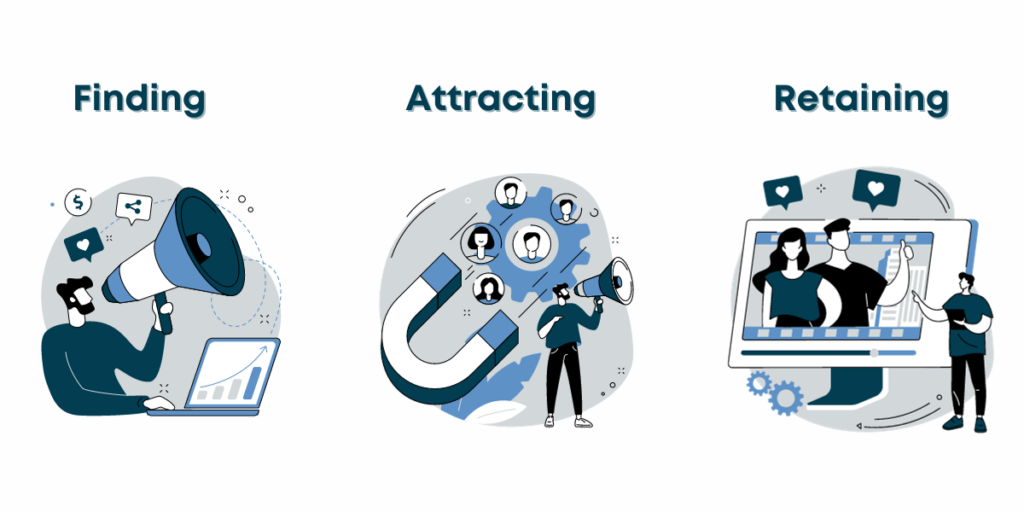Talent acquisition is a term that is becoming increasingly common when talking about recruitment. It’s not surprising since a good talent acquisition strategy can create value in many different ways. Companies can, for example, more easily identify, attract, and retain talents that are essential for achieving growth goals and shaping a thriving work culture. It can also reduce the risk of prolonged recruitment processes and costly failed recruitments.
Here, you can learn more about the topic and get tips on how to make the most of talent acquisition
What is talent acquisition?
Talent acquisition can be described as a long-term strategy aimed at finding, attracting, recruiting, and retaining talents that drive the company’s economic growth and benefit the work culture. So, it’s not just about recruiting talents. Talent acquisition requires a deep understanding of the company’s overall visions and the talents needed to achieve set goals.

Difference between talent acquisition and recruitment
You can say that recruitment is a part of talent acquisition. When talking about recruitment, it refers to the recruitment process for a specific role. It often starts with creating a job profile and ends with onboarding.
On the other hand, talent acquisition is a long-term strategy with a broader perspective. The work with talent acquisition is ongoing, unlike the recruitment process which has a beginning and an end. For example, it often involves strategic efforts to strengthen the company’s position as an attractive workplace.
Talent acquisition benefits companies in the long run
A well-established talent acquisition strategy can create value for your company in many different ways. For example, only 29% of larger companies feel they have the right IT talents employed. Talent acquisition can help you understand the competencies you need and attract the right candidates. In the long run, you often regain the time, money, and energy you invest in developing a strong talent acquisition strategy.
For instance, it significantly eases the recruitment process by providing a clear picture of the talents you are looking for. If you’ve also worked on employer branding, chances are that the market’s top talents are already looking for the role and are actively seeking to join your company.
Talent acquisition also reduces the risk of costly failed recruitments and poor matches. A failed recruitment can lead to recruitment costs landing at 50,000 Euros or more. This cost can be largely avoided by carefully mapping out the company’s competency needs and clearly communicating work culture, benefits, and expectations.
How to succeed in talent acquisition?
To succeed in talent acquisition, you need to connect the company’s goals and visions with the need for personnel and skills. This means that you need to identify the necessary competencies and personal qualities that help the company grow. You also need to understand how to evaluate, attract, and reach these candidates.
For example, you can analyze which roles and competencies are most critical in creating value for the company and customers. This way, it’s easier to prioritize which talents you need to recruit and consider developing internal training programs.
At the same time, you need to understand what the market’s top talents desire from their employers. According to Statista, impactful work is the most important factor, followed by opportunities for career advancement and employer values.
However, it’s essential to investigate whether there are other factors that influence talent’s choices when deciding on a workplace. Do they, for example, value competitive salaries or a flexible work arrangement? By understanding what current and potential talents are looking for, it becomes easier to succeed in retaining, attracting, and recruiting them.

Talent acquisition helps you find and attract the market’s top talents
As mentioned, talent acquisition includes several areas. However, a significant part of the strategies focuses on how companies can find and attract candidates. Here are some areas that many talent acquisition experts often work with:
Employer branding aids your talent acquisition strategy
Employer branding is a comprehensive term that, in short, means actively working to create an appealing workplace and strengthen the company’s position as an attractive employer. It can involve promoting the benefits of being employed, such as generous perks, competitive salaries, flexible work arrangements, and opportunities for internal training.
Today’s employees also value a balance between private and work life, as well as employer values. Therefore, having clear guidelines that are easy to communicate to potential candidates is crucial.
Bonus programs for internal referrals
In some cases, the perfect talent may be closer than you think. Many companies encourage their employees to recommend suitable candidates when a new role needs to be filled. If an employee recommends a candidate who is subsequently hired, the referrer receives a bonus.
A significant advantage of encouraging your current employees to recommend candidates is that they often share fundamental values and, therefore, are likely to be a good match for the work culture.
Use digital presence as part of your talent acquisition strategy
A strong digital presence with easily accessible information about work culture, company values, and benefits is a must for talent acquisition. Candidates often carefully evaluate potential employers, so having a clear description of what it’s like to work at your company across various digital channels is beneficial.
For example, many companies use social media to market products and services. Social media is also an excellent way to communicate your company’s values and culture. Some companies, therefore, have a separate social profile that showcases the company from the perspective of its employees. Work culture, activities, and internal training are examples of things that can give potential candidates an idea of what it’s like to work at your company.
Network and build relationships with future talents
Active networking makes it easier to build relationships with future candidates. For example, you can participate in industry-related events, fairs, and seminars. It’s also worth reaching out to educational institutions that train students in subjects related to the roles you need to fill.
You can also use your digital presence to network. Platforms like LinkedIn are perfect for connecting with potential candidates and sharing information online.
Headhunting and alternative recruitment methods
The classic way to find talent is to write a job ad and wait for applications to come in. In the best case, you receive several interesting candidates that you want to proceed with, in the recruitment process. This method is effective in many ways, but it may be wise to consider other alternatives.
One method that can be effective is headhunting. It means that talent acquisition specialists actively search for passive candidates who possess the right skills and competencies. Many talents are employed but not closed to new opportunities in other companies.
Save profiles that may be relevant for future recruitment
During a recruitment process, you often come across candidates who may be interesting for future recruitments. Therefore, it’s a good idea to maintain a positive relationship and build long-term networks with profiles that have already shown interest in your company. Just make sure to store all personal information in accordance with prevailing laws and regulations.

Talent acquisition within IT and Tech is our expertise
At INSCALE, we have over 17 years of experience in talent acquisition, specializing in IT and Tech. Our talent acquisition experts have a deep insight into sought-after competencies and skills in the industry. This has helped us develop an optimized recruitment process that is also tailored to each company’s needs and preferences.
We have also built a broad network on a global level, which we use when headhunting and recruiting talents. This way, we keep track of the market’s best talents and can effectively find a candidate who matches the job profile, company values, and work culture.
Feel free to learn more about INSCALE’S unique TaaS (Talent-as-a-Service) approach or book a meeting, and we’ll tell you more!


